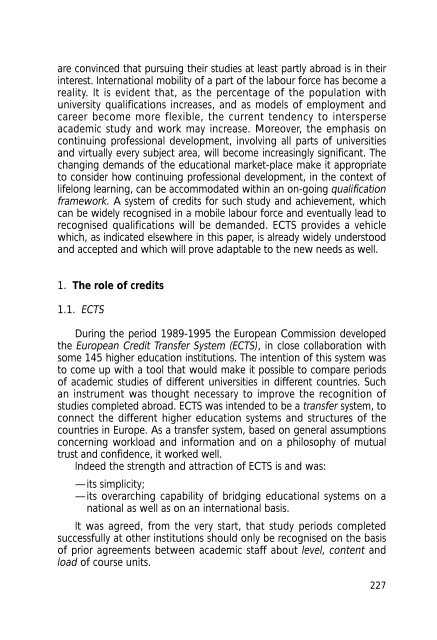Final Report Pilot Project - Relaciones Internacionales de la ...
Final Report Pilot Project - Relaciones Internacionales de la ...
Final Report Pilot Project - Relaciones Internacionales de la ...
You also want an ePaper? Increase the reach of your titles
YUMPU automatically turns print PDFs into web optimized ePapers that Google loves.
are convinced that pursuing their studies at least partly abroad is in their<br />
interest. International mobility of a part of the <strong>la</strong>bour force has become a<br />
reality. It is evi<strong>de</strong>nt that, as the percentage of the popu<strong>la</strong>tion with<br />
university qualifications increases, and as mo<strong>de</strong>ls of employment and<br />
career become more flexible, the current ten<strong>de</strong>ncy to intersperse<br />
aca<strong>de</strong>mic study and work may increase. Moreover, the emphasis on<br />
continuing professional <strong>de</strong>velopment, involving all parts of universities<br />
and virtually every subject area, will become increasingly significant. The<br />
changing <strong>de</strong>mands of the educational market-p<strong>la</strong>ce make it appropriate<br />
to consi<strong>de</strong>r how continuing professional <strong>de</strong>velopment, in the context of<br />
lifelong learning, can be accommodated within an on-going qualification<br />
framework. A system of credits for such study and achievement, which<br />
can be wi<strong>de</strong>ly recognised in a mobile <strong>la</strong>bour force and eventually lead to<br />
recognised qualifications will be <strong>de</strong>man<strong>de</strong>d. ECTS provi<strong>de</strong>s a vehicle<br />
which, as indicated elsewhere in this paper, is already wi<strong>de</strong>ly un<strong>de</strong>rstood<br />
and accepted and which will prove adaptable to the new needs as well.<br />
1. The role of credits<br />
1.1. ECTS<br />
During the period 1989-1995 the European Commission <strong>de</strong>veloped<br />
the European Credit Transfer System (ECTS), in close col<strong>la</strong>boration with<br />
some 145 higher education institutions. The intention of this system was<br />
to come up with a tool that would make it possible to compare periods<br />
of aca<strong>de</strong>mic studies of different universities in different countries. Such<br />
an instrument was thought necessary to improve the recognition of<br />
studies completed abroad. ECTS was inten<strong>de</strong>d to be a transfer system, to<br />
connect the different higher education systems and structures of the<br />
countries in Europe. As a transfer system, based on general assumptions<br />
concerning workload and information and on a philosophy of mutual<br />
trust and confi<strong>de</strong>nce, it worked well.<br />
In<strong>de</strong>ed the strength and attraction of ECTS is and was:<br />
—its simplicity;<br />
—its overarching capability of bridging educational systems on a<br />
national as well as on an international basis.<br />
It was agreed, from the very start, that study periods completed<br />
successfully at other institutions should only be recognised on the basis<br />
of prior agreements between aca<strong>de</strong>mic staff about level, content and<br />
load of course units.<br />
227


